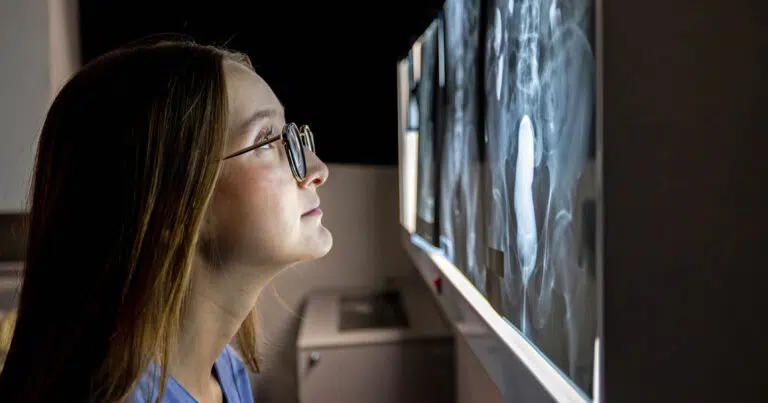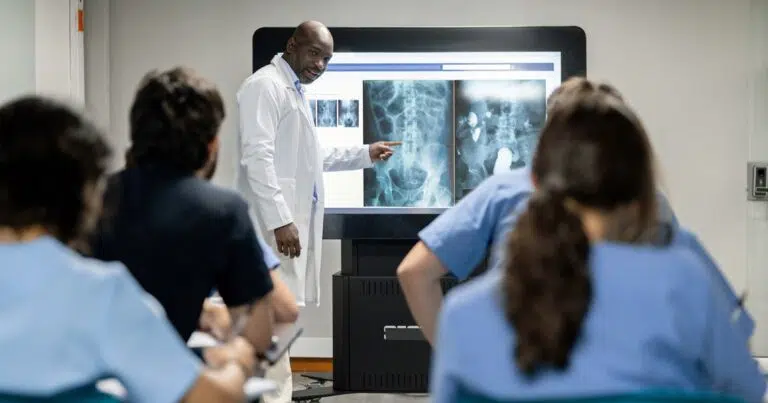Radiology Technologist Career Guide
Looking for a different career guide?
Overview
Radiology Technologists, also known as Radiologic Technologists, are vital members of the healthcare team responsible for performing diagnostic imaging procedures. They use various imaging technologies, such as X-rays, CT scans, MRIs, and mammograms, to help physicians diagnose and treat medical conditions. Radiology Technologists play a crucial role in producing high-quality images, ensuring patient safety, and providing compassionate care during imaging procedures.
Education
To become a Radiology Technologist, you typically need to complete an accredited radiologic technology program. These programs are available at community colleges, technical schools, and hospitals and typically take two years to complete. Coursework includes anatomy, patient positioning, radiation safety, and imaging techniques. Clinical rotations in various healthcare settings are an integral part of the program, providing students with hands-on experience in performing imaging procedures under supervision.
Qualifications

Skills
Staff and Travel Radiology Technologists need a diverse set of skills to succeed in their role. They must have a strong understanding of anatomy and medical imaging technology. Technical skills in operating imaging equipment and obtaining high-quality images are essential for accurate diagnoses. Effective communication and interpersonal skills are crucial for interacting with patients and providing clear instructions during imaging procedures. Radiology Technologists should be detail-oriented to ensure precise positioning and correct exposure settings for optimal images. Additionally, they must prioritize patient safety and adhere to radiation safety protocols.
Responsibilities
Radiology Technologists perform a variety of responsibilities related to diagnostic imaging. They prepare and position patients for imaging procedures, ensuring the accurate capture of the area of interest. Radiology Technologists operate imaging equipment, follow physicians' orders for specific imaging studies, and ensure patient comfort during procedures. They may also administer contrast agents for certain imaging modalities. Radiology Technologists are responsible for maintaining imaging equipment and keeping accurate patient records. Additionally, they collaborate with radiologists and other healthcare professionals to ensure high-quality images for accurate diagnoses.
Salary Insights
The average salary for a Radiology Technologist is $2,237.63 per week.
Last updated on March 21, 2025. Based on active jobs on Vivian.com.
Pros & Cons
Pros of becoming a Radiology Technologist include the opportunity to work with advanced medical imaging technology, the chance to be an essential part of the diagnostic process, and the satisfaction of helping patients by providing crucial diagnostic information. This profession offers opportunities for career advancement and specialization in various imaging modalities.
However, there are some challenges associated with this specialty. Radiology Technologists may need to work irregular hours, including evenings, weekends, and on-call shifts. The job may involve standing for extended periods during imaging procedures, which can be physically demanding. Additionally, working with patients who may be in pain or discomfort can be emotionally challenging. Radiology Technologists must also adhere to strict radiation safety protocols to minimize exposure risks.
In conclusion, becoming a Radiology Technologist requires completing an accredited radiologic technology program, obtaining certification, and obtaining licensure. Radiology Technologists need a combination of technical skills, effective communication abilities, and empathy to provide
Some of the content on this page was enhanced using artificial intelligence.
Join over 1 million healthcare workers that are getting a head start with Vivian.
Join Vivian





